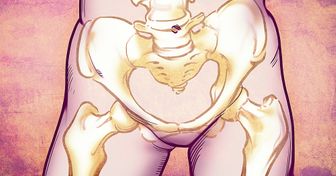7 Facts About the Female Body That Very Few People Know About


It may seem like adding one more vegetable to your diet won’t make a big difference — but it really can — as long as you make sure to include it in your meals every day. Because vegetables have so many vitamins and minerals in them, they can provide your body with healthy nutrients and even prevent some unpleasant health issues. For example, bell peppers
We at Bright Side know how important it is to incorporate as many healthy foods into your regular diet as possible. So let’s see what bell peppers can do for us.
Bell peppers are a good source of iron, and they’re also rich in vitamin C, which helps absorb it better. Iron deficiency is one of the most common causes of anemia. People who have it may feel tired, weak, and short of breath more often. Low levels of iron are also a risk factor for restless leg syndrome. So eating bell peppers can help prevent these issues, especially if you eat them with foods that are high in iron, like meat or spinach.
Bell peppers have a lot of vitamin A and carotenoids, specifically lutein and zeaxanthin, that can help keep your eyes healthy. They can protect your retina from oxidative damage and even reduce the risk of age-related eye diseases, cataracts, and blindness.
Vitamin C also plays an important role in collagen production, which keeps your skin looking young and healthy. If you don’t get enough of it, there’s a higher chance of developing dry and wrinkly skin. A vitamin C deficiency might also cause you to bruise easily, and your wounds might take longer to heal.
Lisopene is one of the carotenoids that bell peppers contain. This component can help improve your cardiovascular health and prevent strokes. It keeps your heart healthy by helping control your blood pressure and regulating cholesterol levels.
Capsaicin is an active component present in bell peppers. It has antioxidant, anti-mutagenic, anti-carcinogenic, and immunosuppressive properties, and it can help prevent the formation of new varicose veins if you eat bell peppers regularly.
One medium bell pepper contains 6% of the recommended amount of manganese. This element, along with zinc and copper, is essential for bone health. Apart from that, vitamins C and K have anti-inflammatory properties and might help prevent osteoporosis.
Bell peppers are a good source of dietary fiber. It can help maintain gut health and even prevent some gastrointestinal disorders. Dietary fiber, along with the fact that around 90% of bell peppers are water, can also aid in weight loss.
100 grams of bell peppers contain 17% of the recommended daily amount of vitamin B6. This vitamin supports your immune system, and not getting enough of it can prevent your body from producing enough antibodies necessary to fight infections.
Do you like bell peppers? Do you eat them often? What’s your favorite way to cook them?











